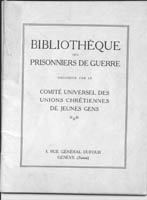Table of Contents
Appendix 11a
Bibliothèque des Prisonniers de Guerre
 Although the World's Alliance of YMCAs prepared this pamphlet for German prisoners incarcerated in France, the document aptly
demonstrates the book lending program the Association developed for all war prisoners. Darius A. Davis recommended that the dissemination
of small libraries to prisoners, especially those in labor detachments which did not have ready access to prison camp libraries,
would be a great value to war prisoners. The YMCA leadership agreed that the distribution of reading material was an ideal option
for POW's to help them pass their idle hours and Davis began supervising the circulating library program in Spring 1916. Reading
helped prisoners enhance their education and their knowledge of the world, helping them improve their situation in life. To meet
this need, the YMCA established libraries in prison camps, normally as lending libraries or reading room material in Association
huts. Small, portable libraries also served POW's assigned to work parties outside of the main prison camp. While these prisoners
avoided the monotony of camp life, they were also separated from prison social welfare programs.1
Although the World's Alliance of YMCAs prepared this pamphlet for German prisoners incarcerated in France, the document aptly
demonstrates the book lending program the Association developed for all war prisoners. Darius A. Davis recommended that the dissemination
of small libraries to prisoners, especially those in labor detachments which did not have ready access to prison camp libraries,
would be a great value to war prisoners. The YMCA leadership agreed that the distribution of reading material was an ideal option
for POW's to help them pass their idle hours and Davis began supervising the circulating library program in Spring 1916. Reading
helped prisoners enhance their education and their knowledge of the world, helping them improve their situation in life. To meet
this need, the YMCA established libraries in prison camps, normally as lending libraries or reading room material in Association
huts. Small, portable libraries also served POW's assigned to work parties outside of the main prison camp. While these prisoners
avoided the monotony of camp life, they were also separated from prison social welfare programs.1
The challenge facing the YMCA was the task of collecting books and getting them past military censors, especially since camp authorities went to great pains to isolate prisoners from war news and propaganda. To avoid any controversy regarding the selection of books, Association workers collected works published before 1914. This system was further refined by conducting negotiations with the Ministries of War which administered the prison camps. In this case, the Association reached an agreement with the Ministry of War in Paris whereby the YMCA organized ten small collection of books, Series A-J, into libraries of twenty-four to thirty-three works. The pamphlet provides a description of the books contained in each of the series, along with the French translation. While each series contained a Feldgesangbuch (Field Song Book), the remainder of the books differed between each series. Prisoners could read books on a wide range of topics including literature and poetry, biographies, science (biology, geology, and astronomy), religion, history, philosophy, geography, humor, art, and song books. While most of these books were in German, most series contained works in French and/or English. Work parties could return their libraries in exchange for another library in the series. By developing this system, the Association was able to speed book collections through the military censorship system and into the hands of eager POW's.
Notes:
Note 1: World's Alliance of YMCA's. Bibliothèque des Prisonniers de Guerre. Lausanne, Switzerland: Imp. Cooperative la Concorde, ca. 1916. Armed Services Records Box 55, Folder: "Prisoner of War Work-Pamphlets in Various Languages-ca. 1914-1918," Kautz Family YMCA Archives, University of Minnesota, Minneapolis, MN.